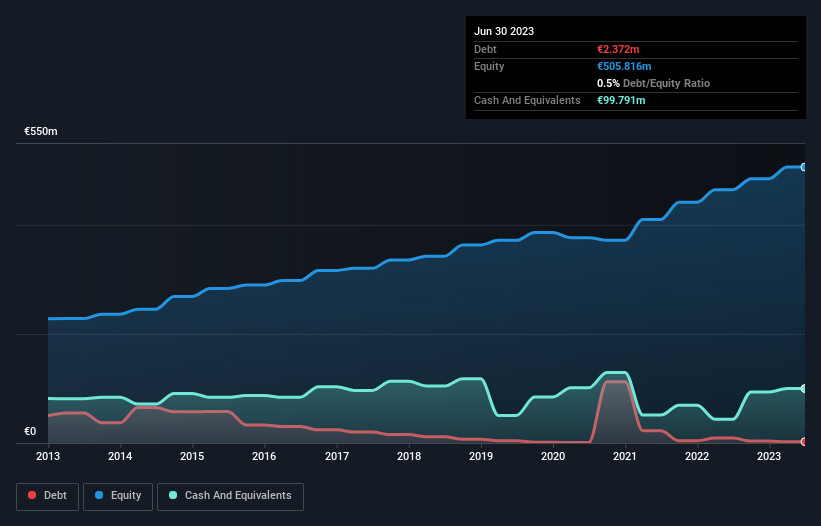
Warren Buffett famously said, 'Volatility is far from synonymous with risk.' So it might be obvious that you need to consider debt, when you think about how risky any given stock is, because too much debt can sink a company. We note that Vetoquinol SA (EPA:VETO) does have debt on its balance sheet. But the more important question is: how much risk is that debt creating?
What Risk Does Debt Bring?
Debt assists a business until the business has trouble paying it off, either with new capital or with free cash flow. If things get really bad, the lenders can take control of the business. However, a more usual (but still expensive) situation is where a company must dilute shareholders at a cheap share price simply to get debt under control. Of course, debt can be an important tool in businesses, particularly capital heavy businesses. When we think about a company's use of debt, we first look at cash and debt together.
See our latest analysis for Vetoquinol
How Much Debt Does Vetoquinol Carry?
The image below, which you can click on for greater detail, shows that Vetoquinol had debt of €2.37m at the end of June 2023, a reduction from €9.05m over a year. But it also has €99.8m in cash to offset that, meaning it has €97.4m net cash.

How Healthy Is Vetoquinol's Balance Sheet?
We can see from the most recent balance sheet that Vetoquinol had liabilities of €117.8m falling due within a year, and liabilities of €25.6m due beyond that. Offsetting this, it had €99.8m in cash and €94.3m in receivables that were due within 12 months. So it can boast €50.8m more liquid assets than total liabilities.
This surplus suggests that Vetoquinol has a conservative balance sheet, and could probably eliminate its debt without much difficulty. Succinctly put, Vetoquinol boasts net cash, so it's fair to say it does not have a heavy debt load!
Also positive, Vetoquinol grew its EBIT by 21% in the last year, and that should make it easier to pay down debt, going forward. The balance sheet is clearly the area to focus on when you are analysing debt. But it is future earnings, more than anything, that will determine Vetoquinol's ability to maintain a healthy balance sheet going forward. So if you're focused on the future you can check out this free report showing analyst profit forecasts.
Finally, while the tax-man may adore accounting profits, lenders only accept cold hard cash. Vetoquinol may have net cash on the balance sheet, but it is still interesting to look at how well the business converts its earnings before interest and tax (EBIT) to free cash flow, because that will influence both its need for, and its capacity to manage debt. Over the last three years, Vetoquinol reported free cash flow worth 16% of its EBIT, which is really quite low. That limp level of cash conversion undermines its ability to manage and pay down debt.
Summing Up
While we empathize with investors who find debt concerning, you should keep in mind that Vetoquinol has net cash of €97.4m, as well as more liquid assets than liabilities. And we liked the look of last year's 21% year-on-year EBIT growth. So we don't think Vetoquinol's use of debt is risky. Over time, share prices tend to follow earnings per share, so if you're interested in Vetoquinol, you may well want to click here to check an interactive graph of its earnings per share history.
If you're interested in investing in businesses that can grow profits without the burden of debt, then check out this free list of growing businesses that have net cash on the balance sheet.
New: Manage All Your Stock Portfolios in One Place
We've created the ultimate portfolio companion for stock investors, and it's free.
• Connect an unlimited number of Portfolios and see your total in one currency
• Be alerted to new Warning Signs or Risks via email or mobile
• Track the Fair Value of your stocks
Have feedback on this article? Concerned about the content? Get in touch with us directly. Alternatively, email editorial-team (at) simplywallst.com.
This article by Simply Wall St is general in nature. We provide commentary based on historical data and analyst forecasts only using an unbiased methodology and our articles are not intended to be financial advice. It does not constitute a recommendation to buy or sell any stock, and does not take account of your objectives, or your financial situation. We aim to bring you long-term focused analysis driven by fundamental data. Note that our analysis may not factor in the latest price-sensitive company announcements or qualitative material. Simply Wall St has no position in any stocks mentioned.
About ENXTPA:VETO
Vetoquinol
A veterinary pharmaceutical company, designs, develops, and sells veterinary drugs and non-medicinal products in Europe, the Americas, and the Asia Pacific region.
Very undervalued with excellent balance sheet.
Similar Companies
Market Insights
Community Narratives



